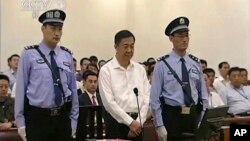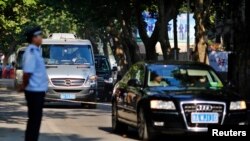Disgraced Chinese politician Bo Xilai has denied charges of bribery against him, as he stood trial Thursday in one of China's most explosive political scandals in decades.
Bo, who was in line to become one of China's top leaders, is also being tried for corruption and abuse of power related to the alleged cover up of his wife's murder of a British businessman.
Thursday's hearing focused primarily on charges that Bo illegally accepted over $4 million over the course of several years. In particular, Bo rejected charges that he took bribes from a real estate developer in the eastern city of Dalian.
Bo Xilai Bio Box
Bo Xilai- Father Bo Yibo was one of the founders of the People's Republic of China
- Bo Xilai joined the Communist Party in 1980
- Was mayor of Dailan, governor of Liaoning province and commerce minister
- Named leader of Chongqing city in 2007 and ascended to membership in the Politburo
- Gained prominence for launching crackdown on corruption in Chongqing
- Expelled form Communist Party in September, 2012
- Found guilty of bribery, corruption and abuse of power in September, 2013, sentenced to life in prison
Court excerpts show Bo, who served as mayor and party chief in Dalian, retracted an earlier confession about the bribery, saying his "mind was a blank" and he did not fully understand the charges against him.
He also attacked the testimony of the developer, Tang Xiaolin, calling him a "crazy dog" and saying the developer was trying to frame him for the crime.
Thursday's trial was the first time Bo, 64, had been seen in public since his arrest in March 2012. A picture released by the court showed him standing somberly, his hands folded, next to two policemen in the dock.
State broadcaster CCTV reported the trial in Jinan, the capital of eastern Shandong Province, will last two days and that a verdict is expected in early September.
The official Xinhua news agency said Bo expressed hope the proceedings can be held "in a reasonable and fair manner" and follow proper legal processes.
Outside the court, police blocked off streets with large plastic barriers. Nearby, a few Bo supporters who held a protest questioning the fairness of the trial were quickly scattered by police for a second straight day.
Though state media said 19 journalists were allowed into the courtroom, foreign media were kept out and the trial was not televised, reflecting the government's sensitivity about the case.
Fred Wang with VOA's Mandarin service is with other journalists watching the proceedings from a media center set up at a hotel near the court.
"We waited in a newsroom for about three to four hours, just watching Weibo, the Chinese Twitter, to release one picture after another," Wang said. "We didn't have any access [to the courtroom] at all. Then a spokesman just read a news release and didn't answer any questions."
But official government microblogs did provide what some called an unprecedented, real-time account of the proceedings, as prosecutors laid out the charges against Bo.
Kerry Brown, who heads the University of Sydney's China Studies Center, said the move reflects the Communist Party's acknowledgement that the scandal is on the mind of China's population.
"It shows the media terrain has changed in China. I think there is a sort of appetite to know about this case, and the party has to satisfy that," Brown said.
Despite the increased openness, there is little doubt among China watchers that Bo will be found guilty. Brown, a former British diplomat in Beijing, said the outcome has already been decided by the top members of the party.
"This is not a trial that we can foresee Bo walking free from this court in Jinan. It's just not going to happen. I think we all know that this has been predetermined," Brown said.
Timeline of the Bo Xilai Scandal
Timeline of the Bo Xilai Scandal2012
- February 2: Bo's key ally and Chongqing police chief Wang Lijun is demoted
- February 6: Wang visits U.S. consulate in Chengdu
- March 15: Bo dismissed as Chongqing party chief
- March 26: Britain asks China to investigate November death of Briton Neil Heywood in Chongqing
- April 10: Bo suspended from Communist Party posts. China says Gu is being investigated for Heywood's death
- August 20: Gu given suspended death sentence after confessing to Heywood's murder
- September 24: Wang convicted of defection, power abuse and bribe taking
- September 28: Communist Party expels Bo
2013
- July 25: Bo indicted for bribery, corruption, abuse of power
- August 22: Bo trial begins in Jinan
- September 22: Bo sentenced to life in prison
His downfall began last February, when his police chief Wang Lijun fled to the U.S. consulate in Chengdu. There he told American diplomats about Bo's alleged role in covering up the murder of British businessman Neil Heywood.
Bo's wife, Gu Kailai, was later convicted of murdering the Briton following a failed financial deal. Wang, meanwhile, was convicted on charges including defection, abuse of power and taking bribes.
Prosecutors on Thursday said Bo's son, Bo Guagua, and his wife were involved in accepting some the bribes. When testimony was presented that his wife, Gu Kailai, had acknowledged receiving some of the money, Bo dismissed her testimony as "laughable."
Until now, it was unclear how to what extent Gu Kailai's testimony would play in Bo's trial. Recent media reports had suggested that Gu had agreed to testify in order to reach a deal to protect their son, who is studying in the United States.







